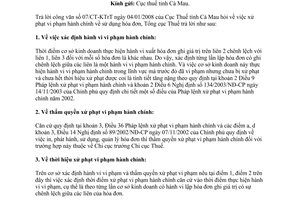Nội dung toàn văn Official Dispatch No. 1785/TCT-PC on the sanctioning of administrative violation
|
MINISTRY OF FINANCE |
SOCIALIST REPUBLIC OF VIET NAM |
|
No. 1785/TCT-PC |
Hanoi, May 09, 2008 |
OFFICIAL LETTER
ON THE SANCTIONING OF ADMINISTRATIVE VIOLATIONS IN THE USE OF INVOICES
To: The Tax Department of Ca Mau province
In response to Official Letter No. 07/CT-KTrT of January 4, 2008, of the Tax Department of Ca Mau province inquiring about the sanctioning of administrative violations in the use of invoices, the General Department of Taxation gives the following reply:
1. Determination of acts of administrative violation:
The business establishment issued invoices with different value written in copy 2 as compared to the value written in copy 1 and copy 3 for each serial number of the invoice at different times. Therefore, each time of making an invoice with different values written in its copies is determined as an act of administrative violation. At the same time as the business establishment has committed this act of administrative violation repeatedly but has not yet been sanctioned while the statute of limitations for sanctioning has not yet expired, this fact is regarded an aggravating circumstance under Clause 2, Article 9 of the Ordinance on Handling of Administrative Violations and Clause 2, Article 6 of the Government’s Decree No. 134/2003/ND-CP of November 14, 2003, detailing the implementation of a number of articles of the 2002 Ordinance on Handling of Administrative Violations.
2. Competence to sanction administrative violations:
Pursuant to Clause 3, Article 36 of the Ordinance on Handling of Administrative Violations and Points a and d, Clause 3, Article 14 of the Government’s Decree No. 89/2002/ND-CP of November 7, 2002, on the printing, issuance, use and management of invoices, in this case, the head of the district-level Tax Department has competence to sanction this administrative violation.
3. Statute of limitations for sanctioning administrative violations:
On the basis of determining acts of violation and the competence to sanction violations specified at Points 1 and 2 above, the statute of limitations for sanctioning administrative violations shall be determined based on the time an act of violation is committed, namely each time the business establishment makes an making invoice with different values written in its copies.
Pursuant to Clause 1, Article 10 of the Ordinance on Handling of Administrative Violations, the statute of limitations for sanctioning administrative violations in the finance domain is two years after an administrative violation is committed.
Clause 3, Article 10 of the Ordinance on Handling of Administrative Violations also stipulates: “Within the time limit specified in Clauses 1 and 2 of this Article, if the individual or organization commits a new act of administrative violation in the same domain in which he/she/it previously committed a violation or arbitrarily shirks or obstructs the sanctioning, the statute of limitations for sanctioning specified in Clauses 1 and 2 of this Article will not apply but shall be re-counted from the time the new administrative violation is committed or the time the act of shirking or obstructing the sanctioning is terminated.”
Pursuant to the above provisions, to determine the statute of limitations for sanctioning administrative violations in the case reported by the Tax Department of Ca Mau province, first it is necessary to determine the time the business establishment committed the new act of violation (i.e., the time of making invoices of 3 subsequent serial numbers). If this time is within the two-year duration counting from the time the business establishment committed the act of making the first invoice with different values written in its copies, the statute of limitations for sanctioning this administrative violation shall be re-counted from the time the business establishment made the invoices of the subsequent numbers with different values written in their copies.
The General Department of Taxation gives the above reply to the Tax Department of Ca Mau province for information and compliance.
|
|
FOR THE GENERAL DIRECTOR OF
TAXATION |



